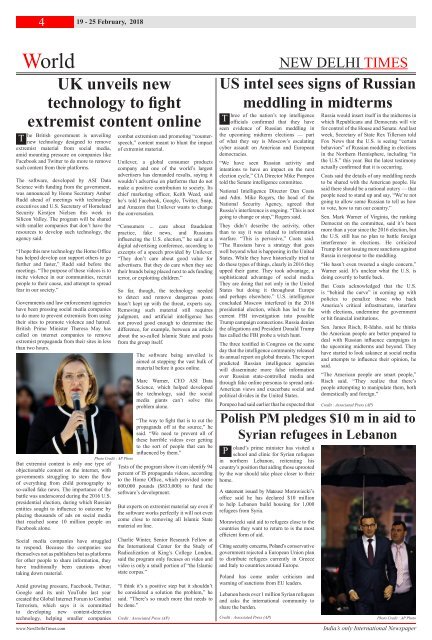19-25 February 2018 - 16 new-min
Create successful ePaper yourself
Turn your PDF publications into a flip-book with our unique Google optimized e-Paper software.
4<br />
<strong>19</strong> - <strong>25</strong> <strong>February</strong>, <strong>2018</strong><br />
T<br />
World<br />
UK unveils <strong>new</strong><br />
technology to fight<br />
extremist content online<br />
he British government is unveiling<br />
<strong>new</strong> technology designed to remove<br />
extremist material from social media,<br />
amid mounting pressure on companies like<br />
Facebook and Twitter to do more to remove<br />
such content from their platforms.<br />
The software, developed by ASI Data<br />
Science with funding from the government,<br />
was announced by Home Secretary Amber<br />
Rudd ahead of meetings with technology<br />
executives and U.S. Secretary of Homeland<br />
Security Kirstjen Nielsen this week in<br />
Silicon Valley. The program will be shared<br />
with smaller companies that don’t have the<br />
resources to develop such technology, the<br />
agency said.<br />
“I hope this <strong>new</strong> technology the Home Office<br />
has helped develop can support others to go<br />
further and faster,” Rudd said before the<br />
meetings. “The purpose of these videos is to<br />
incite violence in our communities, recruit<br />
people to their cause, and attempt to spread<br />
fear in our society.”<br />
Governments and law enforcement agencies<br />
have been pressing social media companies<br />
to do more to prevent extremists from using<br />
their sites to promote violence and hatred.<br />
British Prime Minister Theresa May has<br />
called on internet companies to remove<br />
extremist propaganda from their sites in less<br />
than two hours.<br />
But extremist content is only one type of<br />
objectionable content on the internet, with<br />
governments struggling to stem the flow<br />
of everything from child pornography to<br />
so-called fake <strong>new</strong>s. The importance of the<br />
battle was underscored during the 20<strong>16</strong> U.S.<br />
presidential election, during which Russian<br />
entities sought to influence to outcome by<br />
placing thousands of ads on social media<br />
that reached some 10 million people on<br />
Facebook alone.<br />
Social media companies have struggled<br />
to respond. Because the companies see<br />
themselves not as publishers but as platforms<br />
for other people to share information, they<br />
have traditionally been cautious about<br />
taking down material.<br />
Amid growing pressure, Facebook, Twitter,<br />
Google and its unit YouTube last year<br />
created the Global Internet Forum to Combat<br />
Terrorism, which says it is committed<br />
to developing <strong>new</strong> content-detection<br />
technology, helping smaller companies<br />
www.NewDelhiTimes.com<br />
Photo Credit : AP Photo<br />
combat extremism and promoting “counterspeech,”<br />
content meant to blunt the impact<br />
of extremist material.<br />
Unilever, a global consumer products<br />
company and one of the world’s largest<br />
advertisers has demanded results, saying it<br />
wouldn’t advertise on platforms that do not<br />
make a positive contribution to society. Its<br />
chief marketing officer, Keith Weed, said<br />
he’s told Facebook, Google, Twitter, Snap,<br />
and Amazon that Unilever wants to change<br />
the conversation.<br />
“Consumers ... care about fraudulent<br />
practice, fake <strong>new</strong>s, and Russians<br />
influencing the U.S. election,” he said at a<br />
digital advertising conference, according to<br />
excerpts of a speech provided by Unilever.<br />
“They don’t care about good value for<br />
advertisers. But they do care when they see<br />
their brands being placed next to ads funding<br />
terror, or exploiting children.”<br />
So far, though, the technology needed<br />
to detect and remove dangerous posts<br />
hasn’t kept up with the threat, experts say.<br />
Removing such material still requires<br />
judgment, and artificial intelligence has<br />
not proved good enough to deter<strong>min</strong>e the<br />
difference, for example, between an article<br />
about the so-called Islamic State and posts<br />
from the group itself.<br />
The software being unveiled is<br />
aimed at stopping the vast bulk of<br />
material before it goes online.<br />
Marc Warner, CEO ASI Data<br />
Science, which helped developed<br />
the technology, said the social<br />
media giants can’t solve this<br />
problem alone.<br />
“The way to fight that is to cut the<br />
propaganda off at the source,” he<br />
said. “We need to prevent all of<br />
these horrible videos ever getting<br />
to the sort of people that can be<br />
influenced by them.”<br />
Tests of the program show it can identify 94<br />
percent of IS propaganda videos, according<br />
to the Home Office, which provided some<br />
600,000 pounds ($833,000) to fund the<br />
software’s development.<br />
But experts on extremist material say even if<br />
the software works perfectly it will not even<br />
come close to removing all Islamic State<br />
material on line.<br />
Charlie Winter, Senior Research Fellow at<br />
the International Center for the Study of<br />
Radicalization at King’s College London,<br />
said the program only focuses on video and<br />
video is only a small portion of “the Islamic<br />
state corpus.”<br />
“I think it’s a positive step but it shouldn’t<br />
be considered a solution the problem,” he<br />
said. “There’s so much more that needs to<br />
be done.”<br />
Credit : Associated Press (AP)<br />
NEW DELHI TIMES<br />
US intel sees signs of Russian<br />
meddling in midterms<br />
T<br />
hree of the nation’s top intelligence<br />
officials confirmed that they have<br />
seen evidence of Russian meddling in<br />
the upco<strong>min</strong>g midterm elections — part<br />
of what they say is Moscow’s escalating<br />
cyber assault on American and European<br />
democracies.<br />
“We have seen Russian activity and<br />
intentions to have an impact on the next<br />
election cycle,” CIA Director Mike Pompeo<br />
told the Senate intelligence committee.<br />
National Intelligence Director Dan Coats<br />
and Adm. Mike Rogers, the head of the<br />
National Security Agency, agreed that<br />
Russia’s interference is ongoing. “This is not<br />
going to change or stop,” Rogers said.<br />
They didn’t describe the activity, other<br />
than to say it was related to information<br />
warfare. “This is pervasive,” Coats said.<br />
“The Russians have a strategy that goes<br />
well beyond what is happening in the United<br />
States. While they have historically tried to<br />
do these types of things, clearly in 20<strong>16</strong> they<br />
upped their game. They took advantage, a<br />
sophisticated advantage of social media.<br />
They are doing that not only in the United<br />
States but doing it throughout Europe<br />
and perhaps elsewhere.” U.S. intelligence<br />
concluded Moscow interfered in the 20<strong>16</strong><br />
presidential election, which has led to the<br />
current FBI investigation into possible<br />
Trump campaign connections. Russia denies<br />
the allegations and President Donald Trump<br />
has called the FBI probe a witch hunt.<br />
The three testified in Congress on the same<br />
day that the intelligence community released<br />
its annual report on global threats. The report<br />
predicted Russian intelligence agencies<br />
will disse<strong>min</strong>ate more false information<br />
over Russian state-controlled media and<br />
through fake online personas to spread anti-<br />
American views and exacerbate social and<br />
political divides in the United States.<br />
Pompeo had said earlier that he expected that<br />
P<br />
Russia would insert itself in the midterms in<br />
which Republicans and Democrats will vie<br />
for control of the House and Senate. And last<br />
week, Secretary of State Rex Tillerson told<br />
Fox News that the U.S. is seeing “certain<br />
behaviors” of Russian meddling in elections<br />
in the Northern Hemisphere, including “in<br />
the U.S.” this year. But the latest testimony<br />
actually confirmed that it is occurring.<br />
Coats said the details of any meddling needs<br />
to be shared with the American people. He<br />
said there should be a national outcry — that<br />
people need to stand up and say, “We’re not<br />
going to allow some Russian to tell us how<br />
to vote, how to run our country.”<br />
Sen. Mark Warner of Virginia, the ranking<br />
Democrat on the committee, said it’s been<br />
more than a year since the 20<strong>16</strong> election, but<br />
the U.S. still has no plan to battle foreign<br />
interference in elections. He criticized<br />
Trump for not issuing more sanctions against<br />
Russia in response to the meddling.<br />
“He hasn’t even tweeted a single concern,”<br />
Warner said. It’s unclear what the U.S. is<br />
doing covertly to battle back.<br />
But Coats acknowledged that the U.S.<br />
is “behind the curve” in co<strong>min</strong>g up with<br />
policies to penalize those who hack<br />
America’s critical infrastructure, interfere<br />
with elections, under<strong>min</strong>e the government<br />
or hit financial institutions.<br />
Sen. James Risch, R-Idaho, said he thinks<br />
the American people are better prepared to<br />
deal with Russian influence campaigns in<br />
the upco<strong>min</strong>g midterms and beyond. They<br />
have started to look askance at social media<br />
and attempts to influence their opinion, he<br />
said.<br />
“The American people are smart people,”<br />
Risch said. “They realize that there’s<br />
people attempting to manipulate them, both<br />
domestically and foreign.”<br />
Credit : Associated Press (AP)<br />
Polish PM pledges $10 m in aid to<br />
Syrian refugees in Lebanon<br />
oland’s prime <strong>min</strong>ister has visited a<br />
school and clinic for Syrian refugees<br />
in northern Lebanon, reiterating his<br />
country’s position that aiding those uprooted<br />
by the war should take place closer to their<br />
home.<br />
A statement issued by Mateusz Morawiecki’s<br />
office said he has declared $10 million<br />
to help Lebanon build housing for 1,000<br />
refugees from Syria.<br />
Morawiecki said aid to refugees close to the<br />
countries they want to return to is the most<br />
efficient form of aid.<br />
Citing security concerns, Poland’s conservative<br />
government rejected a European Union plan<br />
to distribute refugees currently in Greece<br />
and Italy to countries around Europe.<br />
Poland has come under criticism and<br />
warning of sanctions from EU leaders.<br />
Lebanon hosts over 1 million Syrian refugees<br />
and asks the international community to<br />
share the burden.<br />
Credit : Associated Press (AP)<br />
Photo Credit : AP Photo<br />
India’s only International Newspaper
















